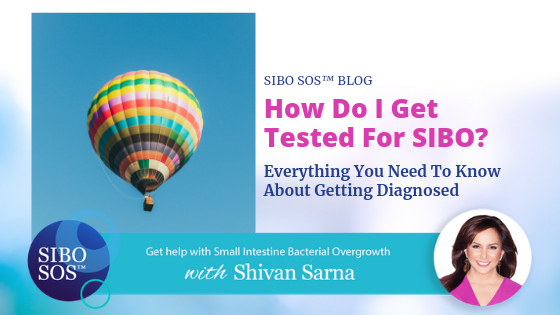
Do I Really Need to Get Tested for SIBO?
Do you suspect you might have Small Intestine Bacterial Overgrowth also known as SIBO? Symptoms might include bloating, constipation, diarrhea, or pain.
If the answer is yes, then your next question should be:
Should I get tested to find out if I really have SIBO?
The short answer is YES.
You might be tempted to move forward with treatment for SIBO without getting tested, but you should know there are 35-40 different diseases that have the exact same symptoms as SIBO. According to Dr. Allison Siebecker, ND, “The symptoms of SIBO are nonspecific.” Just because you are experiencing the symptoms doesn’t necessarily mean you have SIBO.
It’s very important to know whether or not you actually have it because the treatment for SIBO is going to be very different from other conditions. For example, antimicrobials are typically used to treat SIBO, and because these antimicrobials do have the potential to alter the microbiome of a person, we need to be sure that they are necessary before we move forward. Therefore, it is important to know if a person has SIBO or not.
There are multiple types of SIBO testing. There are multiple ways to get tested. And, the outcome isn’t as simple as a “positive or negative” result. In my experience, I have found SIBO breath testing to be the most accurate and the most accessible.
Today, I will share everything I know about SIBO testing with you.
A number of studies have been conducted on how effective you could diagnose SIBO based on symptoms alone, and the results showed it was not at all reliable.
It is so common to self diagnose SIBO after years of experiencing IBS symptoms. When one finally gets tested for SIBO/IM there is this odd sense of relief.
The reason why you should not self diagnose without SIBO testing is because it might be some of the many other conditions that can cause bloating and other gut symptoms from parasites, candida, and even ovarian cancer. That being said, you can also have more than one condition at the same time.
SIBO might be part of the story, but the rest may be caused by something else.
You’ll want to make sure that the provider you’re seeing is screening for some of those conditions that can mimic SIBO, such as celiac disease, inflammatory bowel disease, food sensitivities, parasites, and allergies. (Some of these are done via stool testing. Reminder, stool testing will not tell you if you have SIBO/IMO or not.)
Treatment of SIBO can be harmful if you do not have it, but assuming you have it could make you overlook the true cause of your symptoms. Remember, SIBO/IMO is caused by something else and causes other things.
It’s for this reason that accurate testing is so important.
Don’t Rely on These Tests for a SIBO Diagnosis
Why stool testing doesn’t work for SIBO/IMO testing
A quick anatomy lesson, the small intestine is where your nutrients primarily get absorbed and the large intestine is where it’s on its way out of the body. The large intestine is where your stool lives, therefore a stool test only tests the large intestine and not the small intestine.
Stool tests can tell you a lot of valuable information, but it cannot tell you if you have SIBO/IMO. The only thing that can do that is a breath test or jejunal aspiration performed during an upper endoscopy are the only ways to accurately diagnose SIBO. Many doctors believe a stool test can diagnose SIBO simply because it involves the intestines. I am flabbergasted at how many people have had practitioners order them stool tests to try to diagnose SIBO/IMO.
In truth, the stool more accurately represents the very end of the large intestine. It doesn’t show bacterial overgrowth in a separate organ that’s way up above. There is a possibility that a stool test could indicate an issue with the small intestine, but it cannot diagnose small intestine bacterial overgrowth. An overgrowth of bacteria in a stool sample could be called large intestinal bacterial overgrowth, or LIBO.
As Dr. Morstein put it: “We have to stop physicians from doing stool tests and then declaring that this can be an indication of what is going on in the small intestine. There are about 500,000 kinds of bacteria in the colon. To say that a stool test reflects any microbiome in the small intestine is completely inaccurate and incorrect.
There are also times when tests for urine organic acids are mistakenly used to test for SIBO/IMO. Again, this is a very interesting and useful test that can reveal all kinds of helpful data. You need to find a practitioner who knows how to interpret it properly. One of my go to people for this is Dr. Dan Kalish. A urine organic acidstest can detect certain bacterial metabolites, and if they are over abundance, we know there are too many bacteria. What it cannot do, however, is to distinguish between the large and small intestines. Therefore, it can not be used to diagnose SIBO/IMO.
Why Choose Breath Testing For SIBO
For accurate SIBO testing, glucose or lactulose breath tests are the most common options. A breath test is non-invasive and can even be performed at home. In fact, you can even order it yourself. Plus, it’s affordable, even if your insurance won’t cover the test.
According to Dr. Mark Pimentel, breath tests correlate with symptoms AND with super-advanced small bowel deep-sequencing being done at labs like Cedars-Sinai. You might have read or heard a rumor that breath testing isn’t as accurate as a culture or that it simply can’t do what it claims to do.
However, Dr. Mark Pimentel says that we can now “show that SIBO can be proven by deep sequencing—greater than 1000 bacteria per milliliter in the gut is SIBO—and that both of those correlate directly with 90-minute breath tests, meaning the breath test is valid.” Additionally, the markers in the breath test correlate with the symptoms. For example, diarrhea, urgency, and bloating are all correlated with testing markers.
“The point is, for the first time, we’ve internally validated the breath test. Breath tests are valid. And they predict response to antibiotics.”
To learn more about SIBO breath testing, watch this video The 3 Gas Breath Test for SIBO/IMO: What it is and how to do it with Aniruddh Pandit. Click here to go watch the video.
When you do a breath test, you drink a certain type of sugar. Lactulose is the sugar we like to use during the breath test. It is a sugar that is not absorbed by the body. In other words, it stays in the gut until it reaches your colon. It’s a good way to get an idea of what’s going on throughout the entire gut. Sugar ferments when it comes in contact with bacteria. The bacteria produce gases as they ferment. Our job is to find the gases that humans do not produce. Hydrogen and methane are the gases that we are looking for. We know that when we see those levels rise early, within 90 minutes, it means that those gases are likely to have originated from the small intestine.
So why would we look for bacteria in the small intestine?
Well, the human body does not produce hydrogen or methane gas. Only bacteria can produce hydrogen and/or methane gas when it’s fermenting or rotting. Therefore, if we find gas through the breath test, then we have confirmation of bacteria in the small intestine, which could be a strong indicator of SIBO.
How to Prepare for SIBO Testing
Like many different types of testing, it’s important to prepare for the SIBO breath test too. If you don’t prepare properly, you may get results that are inconsistent with the clinical impressions.
The preparation involves eating a restricted diet within 24 hours of the test, followed by a 12-hour fast, which is typically overnight. While this might seem a bit inconvenient, it’s worth it.
When you wake up, you’re ready!
All you need is to have your breath collection kit with you, and use the closed capture device to collect your breath.
Here is a short video (and a sneak peek of the Digestion SOS™ Documentary Series) that shows how the collection tubes look and provides tips for accurate breath testing from QuinTron Instruments (the company that created the equipment used for breath testing).
You can order glucose breath tests directly from Aerodiagnostics. Lactulose tests can be ordered by your physician.
The New Hydrogen Sulfide Test & Flat Line Results
Three gases can now be measured in breath tests: hydrogen, methane, and carbon dioxide (as a control). It has been observed that higher levels of hydrogen are associated with diarrhea, and higher levels of methane are associated with constipation.
There are also some people who get a “flat line” result – what does that mean? Dr. Pimentel believes that this may be due to how hydrogen and methane interact in the intestines, as well as the presence of a third gas: hydrogen sulfide.
“Some people have machines that measure only hydrogen. There are others who measure methane and hydrogen. Others have no carbon dioxide at all. Modern machines measure all three. However, I argue that a machine that measures four is even better. The machine will be available in a few months.
With hydrogen, methane, and now hydrogen sulfide, we can distinguish bacteria from humans. If you have hydrogen-producing bacteria in your gut, they feed hydrogen to the methane producers. The result of this is that you produce methane. Methanogens consume a lot of hydrogen to produce methane when methane is present.
It’s not uncommon to get a flat line breath test because they are eating everything up. Simply put, they consume more methane than they produce. However, they do get energy from this process. This is how the methanogens maintain their own existence. This is how they get their energy.
Now, the sulfate-producing bacteria, the new characters that we’re scrutinizing, use up all the hydrogen to make one hydrogen sulfide. We speculated that this could be the flat line breath test because there was no methane in the flat line, no hydrogen at all, the patients had diarrhea, and they were ill.
We now realize that there’s another gas we haven’t explored yet.”
Interpreting Breath Tests
In Dr. Morstein’s words, there is a great deal of gray area when it comes to interpreting the results of SIBO tests.
It is never as clear cut as a simple yes or no.
You might be discouraged once your SIBO test is completed if you get a confusing report that you don’t understand (or even a report that your doctor can’t understand).
Dr. Taylor says:
We need to acknowledge that this isn’t a perfect tool.
A breath test is only able to provide us with some indications of bacterial overgrowth. We need to make sure that our providers who are interpreting our test should have extensive experience in doing so or at least be up-to-date.
In 2017, Dr. Rezaie’s team from Cedars-Sinai published those fantastic breath testing consensus guidelines. Without a doubt, Dr. Rezaie’s breath testing guidelines have been my go-to tool for being able to interpret breath testing results in a more nuanced way, so that I can explain what’s going on to patients.
These guidelines make it easy to give patients feedback such as “your test is definitely positive by all the most conservative interpretation” or “your test is in that gray area on the borderline” or “we should be thinking about what else could be contributing to your symptoms.”
Make sure to check out our list of SIBO Experts if you need help finding one who can interpret your breath test.
Take a Breath!
Phew, I know understanding SIBO testing is a confusing and complex topic. I hope this post has been a useful resource for you!
If you’re looking for even more information on accurate testing for SIBO, plus treatments, underlying causes, and more – go browse through the SIBO SOS® library of intensive Masterclasses.








1 thought on “Everything you need to know about SIBO testing”
Very helpful and timely. I am in the middle of my first SIBO test right now. Thanks to Eric’s video, which confirmed that I am probably doing this right! While I appreciate all of the thorough and complex information and will continue learning, I like that this is a quick guide. Thanks,